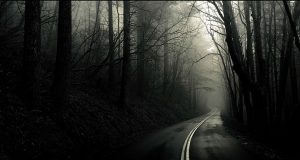 “The Resident” follows an author who has been accepted into an artists’ residency in the mountains where she used to go to girl scout camp. At the beginning, she is elated, but as time passes she becomes increasingly uneasy. For much of this story, and even to an extent still, I was unsure of the exact fantastic element. The most explicitly “fantastic” event, to me, was the appearance on her doorstep of the other half of the rabbit, but even this is not unexplainable. I think that the fantastic element of this story is stored in the way it is written. The writing gives off the impression that the residency contains some vague but malevolent presence, causing the narrator’s unsettling experiences and the progressive loss of her sanity. This was achieved using a variety of horror tropes: The last-stop at the gas station with a strange, unfamiliar program on the tv and a cashier who freezes up at the mention of the narrator’s destination; the expectation that a hand will shoot out from under the bed; the recurring bad weather; the unexplained illnesses; the sudden darkness in the woods; the portrait of the narrator in which she appears utterly dead; the appearance of the rabbit. The narrator herself is aware of the tropes that she is experiencing, and the fact that they are cliché. This ties into my second topic of analysis.
“The Resident” follows an author who has been accepted into an artists’ residency in the mountains where she used to go to girl scout camp. At the beginning, she is elated, but as time passes she becomes increasingly uneasy. For much of this story, and even to an extent still, I was unsure of the exact fantastic element. The most explicitly “fantastic” event, to me, was the appearance on her doorstep of the other half of the rabbit, but even this is not unexplainable. I think that the fantastic element of this story is stored in the way it is written. The writing gives off the impression that the residency contains some vague but malevolent presence, causing the narrator’s unsettling experiences and the progressive loss of her sanity. This was achieved using a variety of horror tropes: The last-stop at the gas station with a strange, unfamiliar program on the tv and a cashier who freezes up at the mention of the narrator’s destination; the expectation that a hand will shoot out from under the bed; the recurring bad weather; the unexplained illnesses; the sudden darkness in the woods; the portrait of the narrator in which she appears utterly dead; the appearance of the rabbit. The narrator herself is aware of the tropes that she is experiencing, and the fact that they are cliché. This ties into my second topic of analysis.
Throughout the story, certain proper nouns are cut off, such as the location of the camp and a few names, including the narrator’s own. This is a literary convention common in older works and can be done for a few reasons, one of which is to imply that the narrator of the story is choosing to censor names out of a desire for privacy or courtesy for other characters, lending a sense of realism. We do not learn the narrator’s name, only that her initials are C—— M——, but I believe we are meant to infer the rest. The narrator is an author whose novel follows someone she considers to be a reflection of herself, saying: “She’s me.” She defends her writing against Lydia, who criticizes her use of tropes (the “madwoman in the attic,” the “mad lesbian”) and her egotistical self-insertion. C—— M—— defends her right to write “concealed autobiography,” which is what this story itself is.
At the end, C—— M—— addresses the reader directly. She says: “Perhaps you’re thinking that I’m a cliché— a weak, trembling thing with a silly root of adolescent trauma, right out of a gothic novel. But I ask you, readers: Thus far in your jury deliberations, have you encountered any others who have truly met themselves?” Here and throughout the novel, Machado defends her use of “tropes” which are really just aspects of her life, and her habit of writing “concealed autobiography” as a form of introspection. After all, a story with no trace of its author is impossible anyway, and if it did exist it would be soulless.
I agree with you on part of the fantastical about this story ties into how the author is telling it. I kept expecting some resolution on the abbreviated name but now rereading I feel like that would take away from it.
I struggled with this story a bit, but your analysis helped me make better sense of it. The way that the story was being told greatly affects what we think as the reader, setting up certain ideas and expectations. The horror elements of this story felt fantastical, even though they could potentially have explanations. As for the use of abbreviations to certain names, I also think that it maintains the idea that the author is writing a reflection of herself (the C—- M—- standing for the author’s name).
An excellent post, as usual, Grace. I too felt throughout the menace that hangs over the story as a result of the horror tropes — horror movie tropes, especially — that Machado employs.
I completely agree with your point that the story has this sense of tension and malevolence, that Machado seems to employ in many of her short stories. I also agree that this seems to be the fantastical side of the story, since it bordered heavily on the side of realism. Additionally, I also agree that the readers infer much about the writer including her name, as the lack of name seems to leave the protagonist a bit blurry to the reader.